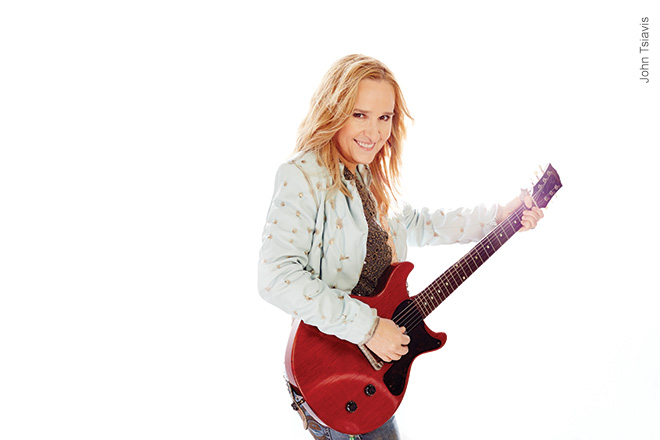MELISSA ETHERIDGE
Collaboration takes the Grammy-winning rocker in new musical directions
Going into her 13th studio album, Melissa Etheridge had two songs written and was well on her way to recording another set of driving, heartfelt pop-rock tunes—the type that have earned her two Grammys and a devoted fan base—but then she realized something. “I can make Melissa Etheridge songs until the cows come home,” she says. So she dramatically shook things up, collaborating with outside songwriters including Jon Levine (Nelly Furtado), Jerrod Bettis (OneRepublic), Jerry Wonda (Wyclef) and RoccStar (Chris Brown). The result is This Is M.E., an album where rock riffs, hip-hop beats and bluegrass strings live together in perfect harmony.
Is this your most pop album yet?
Depending on what you think pop is, yes. And that was intentional. I wanted to do the best of what I do but put it in the latest-model car. It seems that music listeners, especially my kids—I have two teens—enjoy a very real musicianship in their music. They know it when they hear it. I was challenged and said, “I want to create something very real, very musical—and yet put it in this new sound that technology can provide.”
“I Won’t Be Alone Tonight” sounds like Springsteen’s “Dancing in the Dark.”
Oh yeah, it was complete respect—a tribute to Bruce Springsteen from the glockenspiel on. The beat was like how Springsteen used to take old ’50s rock beats and create a song and melody from it. It was so much fun. And “All the Way Home” is very “Born to Run”—cars and guitars and girls or boys, whatever you like.
How did these collaborations work?
What worked with Jon Levine was he would provide the beats while we came up with chord structures. Then I would write the melody and lyrics. With Jerry Wonda, I would create the chords, and he would create the beat. Then we would work on melody and lyrics as I was sitting there. Roccstar—he got up and started freestyling lyrics with me. He really helped with the rhythm and the attitude.
Your thoughts on rap lyrics?
I’m like, “Oh, my God, what are you talking about?” Yeah, there’s that. But rock ’n’ roll, the very definition is to incite change and discomfort—and hip-hop takes that on. It pushes that envelope of sex and society, so I’m not pushing against it. I certainly don’t walk around memorizing raps like my son does, but I understand what it is.
“Monster” is a declaration of LGBT pride.
We had worked up the beat the night before, and I was like, “This is such a great beat—what do I want to sing about?” I didn’t know exactly what. I knew it was “I am a something.” What am I? Before I went to the studio, I actually went to the U.N. to speak. It was the first time their human rights started recognizing LGBT rights. It was really important. [Openly gay NBA player] Jason Collins and Martina Navratilova were there. It was really moving. I left that going, “I am a monster. Everyone thinks I’m a monster.” But you see Jason Collins, and he’s the sweetest, most beautiful human being. What’s going on? People think we’re monsters?
Was collaborating helpful?
I usually sit down with a guitar, beat myself up about how horrible I am—and then I write. It really helped to do it in front of people. Some of those first ideas I was so quick to throw away—“That can’t be good!”—when you do it in front of people, they’re able to say, “That’s a great idea.”
–Kenneth Partridge




comment closed